- Yachting for beginners
- Owning a yacht
- Motor Yachts
- Sailing Yacht
- Indian Ocean
- Mediterranean
- Buying or Selling a Yacht
- Yachting Events
- FAQ – Luxury Yacht Charter
- FAQ – Buying a Yacht
- FAQ – Sell your Yacht
- How Much Does It Cost To Charter A Luxury Yacht?
- All our Blog Post & News


Yacht Brokerage Fees: What You Should Know
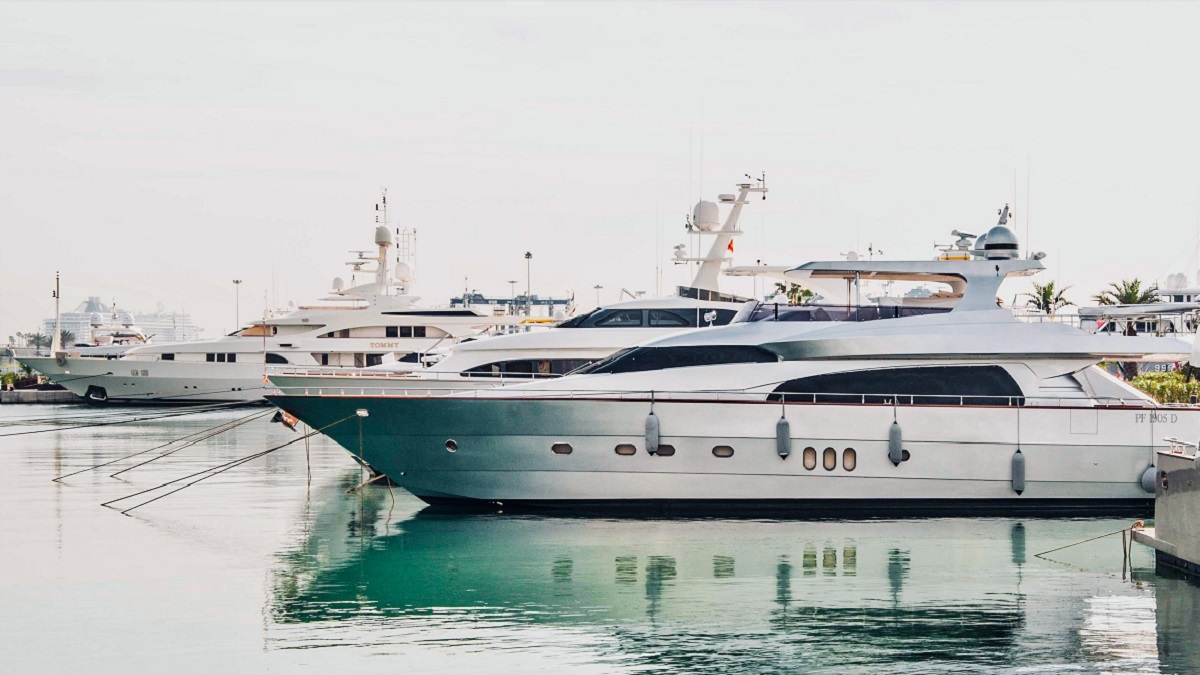
Buying or selling a yacht is an expensive process. With higher value boats, a broker is almost always part of it. While you can sell a boat without a broker, unless it’s a small boat on a local cash deal, a broker increases your odds of getting a buyer and a better price.
But what does this cost you? And what are you getting for your money?
What does a yacht broker do, exactly?

Working on a percentage of selling price means that larger yachts have larger fees. While there is room for negotiation, most brokers are reluctant to discount commissions deeply because larger yachts take considerably more time and effort to sell. Brokers will incur more expenses, and it may take quite a while to realize those expenses in a fairly refined yacht market. It’s also harder to attract co-broker interest on discounted commissions.
For lower value boats, most brokers will have a minimum fee. Smaller, older boats still take time and expenses to sell, but much lower sale prices lead to smaller percentage based fees. A minimum ensures the broker doesn’t take a loss on the sale.
Read also: Yacht vs Superyacht vs Mega Yacht: which differences?
Special sales, marketing, and business considerations
The brokerage typically pays selling and marketing expenses, and they recoup those expenses from the brokerage fee. However, certain exceptional third party expenses may be charged to you at closing costs, for example, bank fees, documentation services, and any exceptional legal services from deal complications, such as undisclosed liens.
The listing broker should have a marketing plan, and will spend money to put together a professional sales package and listing. It’s not common, but if an owner makes requests for additional media shoots or special advertising and marketing beyond what the broker normally provides, there may be charges.
Exclusive vs. Open Listings
An exclusive listing gives one broker the right to sell your boat, but an open listing allows any broker to bring a buyer and make a commission. All brokers prefer exclusive listings, and those who take open listings may offer a different commission for an exclusive listing.
Exclusive listings usually work better for both sides, since brokers will spend money marketing and advertising an exclusive listing that they won’t for an open listing. And you may save a little on the commission and get your boat sold more quickly.
Broker Reputation
The best brokers rarely bend on their fees, because they don’t have to. With years of experience in the business, they know how to get deals done in an exclusive market, and they don’t need to induce new listings by discounting price.
Newer brokers or those with less experience or few listings may offer discounted fees to attract business. There’s nothing wrong with their services, and they may sell your yacht with no problem. But a lower commission also affects co-brokers, so other brokers may give your yacht a lower priority if it doesn’t pay as well.
When are brokerage fees paid?

While there isn’t any universal pricing structure for brokerage services, there are a few normal ranges that you can expect to pay for standard service. So look at all the closing paperwork, statements, and invoices carefully. Most brokers are honest, but like any business transaction, it pays to double check for mistakes or intentional up charges.
A sales commission fee is above 10%
Commissions of 10% are typical in buy/sell transactions and are sometimes lower. But it’s rare to see a sales commission over 10% unless it’s on a small boat with a minimum fee. If there are multiple brokers involved, they should split the commission, not add to it, unless you’re informed in advance.
A charter fee is over 20%
While charter fees typically run 15%, they may go as high as 20% if there are multiple brokers involved in a booking. Amounts over that should draw your concern.
Your bill is significantly more than the management contract specifies
The bottom line is what you have in writing. You should always have a written agreement for any brokerage service, and the fee and payment structure should be spelled out exactly. If you can’t match what you’re being charged with to what they agreed to in writing, then you have a problem.
Other sailors and yacht owners have experience with brokers and are usually happy to share the good and the bad. So ask your yachting friends and find out what they’ve been quoted and had to pay.
And don’t be shy about contacting multiple brokers for quotes on any service before you select one. An honest broker will be upfront with you about costs, and won’t try to hide anything or hesitate when pressed for specifics.
Fair fees ranges for yacht brokers

Windward Yachts Launches WhatsApp Channel for Latest Updates

What differentiates a yacht from a superyacht or a mega yacht?
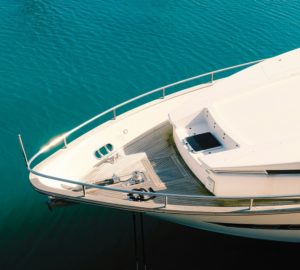
Chartering Requirements and Regulations: A Guide for Boat Owners

Brokerage Services and Fees: What You Need to Know When Choosing and Buying a Yacht
Buying a yacht is a significant investment that requires time and expertise. If you lack the knowledge and time, you may need a yacht broker to help you through the process. However, many people confuse the role of a yacht broker with that of a real estate broker. This article explores the role of a yacht broker and the fees associated with buying a yacht.
The Role of a Yacht Broker
Yacht brokers play a crucial role in yacht buying and selling transactions. They have the necessary knowledge and experience to guide clients through the process. Unlike real estate brokers, yacht brokers offer specialized services tailored to the unique needs of their clients. They help with yacht search, brand recommendation, market pricing analysis, condition checks, advertising, and transaction support.
Brokerage Fees
The commission paid to a yacht broker is typically around 10% of the transaction value. However, for yachts costing more than $10 million, the commission is not more than 10%. The commission is usually shared between the buyer’s representative and the seller’s representative on a 60/40 or 50/50 basis. The commission is specified in the agreement between the boat owner and the broker and is paid after the transaction is complete. This motivates the broker to invest in the sale, knowing that their reward depends on it.
Payment and Transaction Process
The payment process for buying a yacht involves two payments. The first payment, usually 10% of the vessel’s cost, is made at the time of purchase. The second payment, which is 90% of the vessel’s cost, is made when all the transaction documents are ready, and the boat is complete. The boat is then removed from the register (if it is a secondary market), and a Bill of Sale is issued. The Bill of Sale is the main document indicating ownership of the yacht, and it is used to register the yacht in the owner’s country or a charter company.
MOA Yacht Purchase Agreement
The MOA contract is the primary contract used in yacht purchases. This contract fully protects the buyer’s rights. It cannot be found or downloaded from the internet, but a broker can provide it upon request. It is essential to read the contract’s terms since it may contain clauses requiring payment of a commission, even if the yacht is not sold.
Brokerage Fees and Negotiation
Large brokerage firms have fixed rates, and negotiation is not usually possible. Small brokers may be more open to negotiation, but this rarely happens since the brokerage community frowns upon it. A drop in one broker’s percentage can lead to a general drop in the market percentage, which is not desirable. Regular clients may receive preferential terms, but becoming a regular client requires owning several yachts.
Choosing and buying a yacht can be an overwhelming task. Working with a yacht broker can simplify the process and ensure a smooth transaction. The brokerage fees are usually around 10% of the yacht’s cost, and they cover a wide range of services, including advertising, condition checks, and transaction support. Before signing any contracts, it is crucial to read and understand the terms, including any clauses requiring payment of a commission, regardless of whether the yacht is sold or not.
Related Posts
Tips for buying a yacht or boat: what to look for before you buy, setting sail: tips for future ship owners, yacht financing: overview of financing schemes in europe.
Type above and press Enter to search. Press Esc to cancel.
[email protected] | +1-305-857-8939

- Yacht Search
- World’s 100 Largest
- World’s 100 Largest
Superyacht Brokerage Fees: What You Should Know
- Yacht Broker
- Superyacht Brokerage Fees: What You…

Buying or selling a superyacht is a significant endeavor. For many, it’s a once-in-a-lifetime experience filled with excitement and complexity. Navigating this process without expertise can be daunting, which is why engaging a professional is crucial. Superyacht brokers specialize in the complexities of these transactions. They offer invaluable support, ensuring buyers and sellers achieve their goals smoothly and efficiently. The market for superyachts for sale is thriving in Miami, a bustling hub for yachting enthusiasts. Knowing about superyacht brokerage fees is essential for anyone entering this market. This guide will shed light on what you need to know about these fees.
What are Superyacht Brokerage Fees?
Superyacht brokerage fees are the costs associated with hiring a broker to facilitate the sale or purchase of a superyacht. These fees compensate the broker for their expertise, time, and resources. The role of a superyacht broker extends beyond merely connecting buyers and sellers. They handle marketing, negotiations, and paperwork, and ensure compliance with maritime regulations. This comprehensive service justifies their fees, making it a worthwhile investment for anyone serious about buying or selling a superyacht.
How are Superyacht Broker Fees Calculated?
Superyacht broker fees are typically calculated as a percentage of the sale price. This percentage can vary based on several factors, including the yacht’s size, value, and the specifics of the transaction. Here’s a closer look at how these fees are structured.
Percentage of the Sale
The most common method for calculating superyacht brokerage fees is a commission based on the yacht’s sale price. This percentage usually ranges from 5% to 10%. For example, if a superyacht sells for $10 million, the broker’s fee could be between $500,000 and $1 million. The exact percentage is often negotiable and can be influenced by the market conditions, the yacht’s desirability, and the complexity of the sale.
Charter Management Fees
For owners who wish to charter their superyachts, brokers can provide charter management services. These services include marketing the yacht for charter, handling bookings, and managing guest experiences. Charter management fees are typically a percentage of the charter income. This percentage can vary but is usually around 20%. For instance, if a superyacht earns $1 million in charter income annually, the charter management fee might be around $200,000.
Yacht Management Fees
Yacht management involves overseeing the daily operations and maintenance of a superyacht. This service ensures the vessel is in optimal condition and compliant with all regulations. Yacht management fees are generally a fixed annual fee or a percentage of the operating budget. This fee covers the costs of crew management, maintenance, insurance, and compliance. For a large superyacht, these fees can range from $100,000 to several hundred thousand dollars per year, depending on the level of service required.
What Influences Brokerage Fees?
Several factors influence a superyacht broker’s fees associated with buying or selling a superyacht. These fees are not fixed and can vary based on a range of considerations. Understanding these factors will help you better anticipate costs and ensure you are getting value for your investment.
The Size of the Yacht
One of the primary factors influencing brokerage fees is the size of the yacht. Larger yachts generally require more extensive marketing efforts, more complex logistical arrangements, and greater expertise in managing the sale. Consequently, the fees for brokering larger superyachts tend to be higher. This is because the transaction involves more detailed inspections, higher stakes, and often a more discerning buyer profile.
Marketing and Business Considerations
Marketing a superyacht for sale is a specialized process. Brokers invest in high-quality marketing materials, professional photography, virtual tours, and international advertising. The level of marketing required can significantly influence the brokerage fees. For unique or high-value yachts, brokers might employ tailored marketing strategies, including attending boat shows, hosting private viewings, and leveraging industry connections. These enhanced marketing efforts justify higher fees as they increase the likelihood of a successful sale.
Exclusive vs. Open Listings
The type of listing agreement also affects brokerage fees. In an exclusive listing, a single broker represents the yacht, giving them full control over the marketing and sale process. This arrangement often commands a higher commission due to the broker’s dedicated efforts and resources. On the other hand, an open listing allows multiple brokers to market the yacht, which can lead to a lower commission rate. However, exclusive listings often result in more focused and effective marketing strategies, potentially leading to quicker sales.
Broker Reputation
The reputation and track record of the broker can also impact the fees. Established superyacht brokers with a strong industry presence, extensive networks, and a history of successful transactions might charge higher fees. Their expertise and market knowledge can be invaluable, ensuring a smoother transaction process and potentially securing a better sale price for the yacht. Engaging a reputable broker is often worth the additional cost due to the assurance of professionalism and efficiency.
Talk to a Reputed Superyacht Broker Now!
When are brokerage fees paid.
Understanding the timing of when brokerage fees are paid is crucial for buyers and sellers. These fees are typically structured around the different stages of the transaction process.
Buy & Sell Transactions
In traditional buy-and-sell transactions, brokerage fees are usually paid upon the successful completion of the sale. This means that the broker receives their commission once the yacht has been sold and the funds have been transferred. The payment structure is designed to ensure that brokers are motivated to close the deal efficiently and at the best possible price for their clients.
Yacht Charters
For yacht charters, the payment of brokerage fees works slightly differently. Brokers who manage charters typically receive a commission based on the charter income. This fee is often paid when the charter agreement is signed and the charter fee is collected. The commission for charter management services is generally a percentage of the total charter fee, reflecting the broker’s role in securing bookings and managing the charter process.
Yacht Management
In the context of yacht management, fees are typically structured as an annual or monthly fee, covering a range of services such as crew management, maintenance, and compliance. These fees are paid regularly, providing ongoing support and ensuring the yacht remains in optimal condition. The specific payment schedule can vary depending on the management agreement, but it usually involves a fixed payment plan to cover the comprehensive management services provided by the broker.
How Can You Know If You’re Being Overcharged?
Engaging superyacht brokers is a significant investment, and understanding whether you’re being charged fairly is crucial. There are specific indicators and steps you can take to ensure that the fees you’re being charged align with industry standards.
Know the Standard Sale Commission Fee
A common benchmark in the superyacht industry is that sales commission fees should typically range between 5% and 10%. If your broker is charging a commission fee above 10%, this should raise a red flag. Such high fees are generally not justifiable unless there are exceptional circumstances, such as an unusually difficult sale or extraordinary marketing efforts required for a highly unique yacht.
A Charter Fee Does Not Exceed Above 20%
For yacht charters, the standard brokerage fee is usually around 15% to 20% of the charter income. If you find that the fee exceeds 20%, it’s worth investigating further. While some brokers might offer additional services that justify a slightly higher fee, anything significantly above 20% is uncommon and could indicate that you are being overcharged.
Your Bill is Significantly More Than the Management Contract Specifies
When it comes to yacht management, transparency and clarity in the contract are crucial. The management fee should be clearly outlined in the agreement, specifying the services included. If you receive a bill that is significantly higher than what was agreed upon in the contract, it’s important to query the discrepancy. Extra charges should be clearly explained and justified. Unexpected high fees often indicate poor management practices or hidden costs.
One of the best ways to ensure you’re not being overcharged is to seek opinions from other yacht owners or industry professionals. Networking within the yachting community can provide valuable insights. Other owners can share their experiences and the fees they have encountered, giving you a benchmark to compare against. Additionally, consulting multiple superyacht brokers and comparing their fee structures before committing can provide a clearer picture of what constitutes a fair charge.
Common Pitfalls to Avoid
Navigating the process of buying or selling a superyacht can be complex. Engaging superyacht brokers is essential, but there are common pitfalls to avoid to ensure a smooth transaction.
Not Understanding the Fee Structure
One of the biggest mistakes is not fully understanding the brokerage fee structure. Different brokers may have varying fee arrangements, including commission percentages, fixed fees, and additional charges for specific services. Before signing any agreement, ensure you have a clear breakdown of all costs involved. Ask for a detailed explanation of what each fee covers. This will help you avoid unexpected charges and ensure you are fully aware of your financial commitments.
Choosing the Cheapest Broker
While it might be tempting to choose the broker offering the lowest fees, this can be a costly mistake in the long run. The cheapest broker may lack the necessary experience, resources, and network to effectively market and sell your superyacht. Quality service often comes at a price, and investing in a reputable, experienced superyacht broker can lead to a faster sale and a better price for your yacht. Evaluate brokers based on their track record, client testimonials, and the value they offer, not just their fee structure.
Overlooking the Importance of a Good Marketing Plan
Effective marketing is crucial in the superyacht market. Overlooking the importance of a well-crafted marketing plan can result in your yacht sitting on the market for an extended period. A good marketing plan should include professional photography, virtual tours, listings on major yachting websites, and exposure to key industry events. Ensure your broker has a comprehensive marketing strategy that maximizes visibility and attracts serious buyers. This not only facilitates a quicker sale but also helps achieve a better sale price.
Common Questions Answered
What services do superyacht brokers provide.
Superyacht brokers offer a wide range of services, including market analysis, yacht valuation, marketing, negotiation, and handling the legal and financial aspects of the transaction. They also assist with sea trials, surveys, and documentation to ensure a smooth transaction. For sellers, brokers help market the yacht to potential buyers, while for buyers, they help find suitable yachts and negotiate the best price. Read more here .
How long does it typically take to sell a superyacht?
The time it takes to sell a superyacht can vary significantly based on market conditions, the yacht’s condition, and the effectiveness of the marketing strategy. On average, it can take anywhere from several months to a year. Engaging a reputable broker with a robust marketing plan can significantly reduce the time your yacht spends on the market.
Are brokerage fees negotiable?
Yes, brokerage fees are often negotiable. It’s important to discuss and agree upon the fees before signing a contract. Factors such as the yacht’s value, market conditions, and the level of service required can influence the final fee structure. Always ensure that any agreed fees are clearly documented in the brokerage agreement.
How can I ensure confidentiality when selling my superyacht through a broker?
Confidentiality is crucial when selling a superyacht, especially for high-profile owners. Reputable superyacht brokers prioritize confidentiality and have strict protocols in place to safeguard your privacy. This includes using non-disclosure agreements (NDAs) and discreet marketing techniques to protect sensitive information about the yacht and its owner. Before engaging a broker, discuss your confidentiality concerns openly and ensure they have experience handling confidential transactions with discretion and professionalism.
Find an Honest Superyacht Broker in Miami
Navigating the superyacht market can be daunting without the right guidance. Whether you’re buying or selling any size yacht, having an honest, experienced broker by your side is crucial. Miami International Yacht Sales prides itself on transparency, expertise, and a proven track record. We offer personalized service tailored to your unique needs, ensuring you get the best value and experience.
Contact us at +1-305-857-8939 or drop us an email at [email protected] to connect with a trusted superyacht broker in Miami. Let us guide you through the process with integrity and professionalism. Your perfect deal is just a call away. Or, you can just start by exploring our curated list of yachts for sale in Miami on our “ Yacht Search ” page.
Inquire Now

How Much Does a Boat Broker Make: Insights into Their Earnings

Overview of Boat Broker Earnings
Boat brokers facilitate the sale and purchase of boats, earning a living from these transactions. Their income typically comprises a base salary and commissions from sales.
Base Salary : A boat broker’s starting salary can range from $15,000 to $30,000 on the lower end, with some variation based on experience and geographic location. Seasoned professionals, especially those in high-demand regions or selling high-value yachts, might command base salaries closer to $100,870 annually .
Commission : On the sale of a boat, brokers generally earn a commission percentage. This rate hovers around 10% of the sale price for yacht brokers but can vary depending on the price point of the vessels they specialize in. Brokers handling smaller vessels may receive a commission of 2.5% to 3% of the sale price.
The final annual earnings for a boat broker can therefore vary greatly. Factors such as the size and number of boats sold, the broker’s client base, and the prevailing market conditions all influence potential earnings. High-performing brokers have the potential to exceed $100,000 per year .
Typical Commission Range :
- 2.5% – 3% for standard boats
- Up to 10% for luxury yachts
Earnings are also tied to geographic location, market trends, expertise, and the broker’s ability to network and close sales effectively. These figures reflect the potential for a lucratively rewarding profession for adept boat brokers.
Factors Influencing Boat Broker Income
The income of a boat broker is not fixed and varies significantly based on several determinant factors. Understanding these can provide insight into the potential earnings within this profession.
Experience and Location
Boat brokers with extensive experience tend to earn higher incomes due to their established networks and expertise in negotiating deals. Novice brokers may start with a lower income but can see an increase as they gain experience and recognition in the industry. Geographical location also plays a critical role; brokers working in affluent areas with a robust boating culture, like Florida or California, often have the potential to earn more due to a higher volume of sales and clientele who may purchase expensive vessels.
Type of Boats Sold
The size and type of boats sold have a direct impact on a boat broker’s income. Selling luxury yachts, for instance, can lead to hefty commissions, especially if these high-value transactions are consistent. Contrastingly, brokers focusing on smaller, less expensive vessels may need to close more sales to achieve similar income levels. The yacht sales market is notably competitive, and brokers specializing in sought-after models might see greater financial success.
Commission Structures
Income is also heavily influenced by commission structures which can vary from one brokerage to the next. Brokers generally earn a percentage of the sale price, which means higher-priced vessels yield greater commissions. According to some reports, the average commission ranges between 5% and 10% for new yachts, and 2.5% to 7.5% for used yachts. The specific agreement a broker has with their employer or their status as an independent broker can further affect their take-home pay, with some earning more than $100,000 annually.
Average Income by Region

The income of boat brokers can vary significantly depending on the region within the United States. Data indicates that boat brokers in certain areas may earn more due to factors like local economic conditions and the yachting industry’s prominence.
In high-end markets , such as the coastal regions where the demand for luxury yachts is higher, brokers often experience a boost in earnings. For example, boat brokers in the United States have an average base salary of around $108,125 annually, with potential to earn higher based on the range of salaries reported.
The Northeast and West Coast markets show particularly strong figures. From the information gathered, yacht brokers in these regions can command impressive figures, occasionally exceeding the average with incomes shooting towards the $239,604 mark in cases where sales volume and value are high.
Conversely, in some midwestern and southern states, where the boating market might not be as robust, boat brokers might find themselves on the lower end of the salary spectrum, experiencing earnings around the $48,794 range.
For a broader understanding, consider the following average salary figures from various sources:
- Indeed reports an average annual salary for yacht brokers at $108,125 within the United States.
- Glassdoor’s estimate includes a total pay combination, amounting to $156,423 per year, which factors in additional pays like commissions.
- Salary.com suggests a slightly lower range of $72,476 to $91,284 per year for yacht brokers.
These numbers reflect not only base salaries but also potential earnings through commissions, which can heavily influence a boat broker’s annual income.
Income Breakdown

The compensation for boat brokers varies and typically includes a base salary , commissions from sales, and often bonuses and other incentives for performance.
Base Salary
Boat brokers receive a base salary which provides financial stability regardless of sales. As of December 2023, the average annual base salary for a boat broker in the United States is approximately $66,677 . This forms the foundation of a broker’s income, ensuring a steady influx even in the absence of sales.
Commissions
Commissions present a significant portion of a boat broker’s earnings, generally derived from the percentage of the sales price of each boat sold. For instance, with an average sale commission rate, brokers could earn an additional income — a yacht broker could potentially make an average of $121,000 per year with salary and commissions combined, heavily influenced by the location and the type of yachts sold.
Bonuses and Other Incentives
Brokers may also receive bonuses and other incentives which often correlate with their sales achievements or meeting certain performance benchmarks. The potential for additional pay through these means can be substantial, with some brokers earning as much as $64,478 per year in the United States as estimated additional pay. This can include year-end bonuses, performance bonuses, and other forms of profit-sharing.
Comparative Analysis with Similar Professions

When comparing the earnings of boat brokers to those in related fields, it is essential to consider factors such as industry, geographical location, and levels of experience. Boat brokers, for example, have a specialized niche in maritime vehicle sales, which can lead to variable incomes based largely on commission.
Real Estate Agents : They typically earn a median salary of around $51,220 , though this can vary widely depending on the value of the properties they sell and the current housing market. Real estate agents, much like boat brokers, often work on commission.
Car Salespersons : In contrast, car salespersons might see average yearly earnings closer to $41,539 . The automotive industry is more standardized, and sales are generally more frequent but of lower individual value compared to boats or homes.
Insurance Sales Agents : Those in insurance sales can expect a median income of approximately $52,180 . While also commission-based, insurance sales tend to offer more stable and recurring income through policy renewals.
It is clear that a boat broker can expect to earn a base average salary of $108,125 in the United States, with earnings potentially ranging from $48,794 to $239,604 . This variance is reflective of the broker’s ability to sell high-value commodities and the luxury nature of the yachting market.
One should consider that the above figures are subject to fluctuation based on market trends, individual broker performance, and economic factors. The figures also do not always account for differences in regional cost of living, which can influence salary ranges and the purchasing power of earned income.
Career Path and Progression
In the yacht brokerage industry, compensation often reflects one’s level of experience and achieved sales milestones. A broker’s career typically progresses from entry-level to mid-level, and ultimately, to senior opportunities, with each stage offering different potential earning and responsibilities.
Entry-Level Position
At the onset of their careers, entry-level yacht brokers are learning the ropes. They build their networks, learn about different types of boats, and start creating sales strategies. According to Indeed , individuals in these positions may earn around $120k annually in the beginning years, although this figure can vary widely.
Mid-Level Experience
Brokers with 4 to 8 years of experience may see increased earnings potential and begin to cultivate a more nuanced expertise in yacht sales. As reported by Indeed , annual salaries can hover around the $120k mark, often depending on the broker’s sales success and developing industry reputation.
Senior Broker Opportunities
Senior yacht brokers benefit from extensive networks and a strong client base, which can significantly enhance their income. Experienced brokers with over a decade in the industry may earn upward of $130k annually and sometimes substantially more. For example, top companies can offer significantly higher compensation, as much as $249,615 per year, according to salaries reported by Bluewater Yacht Sales employees on Indeed.
Impact of Market Trends on Income

Boat brokers’ incomes are significantly influenced by market trends. When the demand for boats rises, more transactions are likely to occur, leading to increased earnings for brokers. For example, a surge in the boating lifestyle can trigger an uptick in sales, positively affecting brokers’ commissions.
Economic factors also play a crucial role. In a strong economy, discretionary spending on luxury items such as yachts generally increases. Conversely, economic downturns may reduce consumers’ ability to purchase expensive boats, thereby decreasing brokers’ income potential.
Yacht brokers can earn more by selling higher-priced vessels, as the commission is usually a percentage of the sale price. Brokers can expect around 10% commission on each sale. Therefore, their income can vary greatly depending on the types and prices of boats they sell.
Additionally, location affects income. Brokers in affluent areas with a high turnover of luxury yachts, for example, might have the opportunity to earn more than those in regions with fewer high-end transactions.
Agents with a depth of knowledge and strong sales acumen may capitalize on trends such as the increase in eco-friendly vessels or the popularity of certain boat types, positioning themselves to benefit from niches within the market.
Skills and Qualifications for Success
Success as a boat broker hinges on a combination of formal certifications, strong professional networks, and effective sales and negotiation skills.
Necessary Certifications
A broker’s expertise in the yacht industry is often validated by certifications. For instance, becoming a Certified Professional Yacht Broker (CPYB) necessitates meeting specific requirements, such as relevant experience Requirements Explained . Acknowledgement by industry bodies assures clients of the broker’s proficiency and commitment to ethical practices.
Professional Networking
Effective brokers cultivate a web of industry contacts, including manufacturers, boat dealers, and other brokers. Networking enables them to quickly match buyers with sellers and stay ahead of market trends, facilitating successful transactions and repeat business.
Sales and Negotiation Skills
Brokers excel through sharp sales strategies and negotiation tactics. They must understand a boat’s value and persuasively communicate this to both buyers and sellers to close deals. [Performance metrics], such as commission rates, which typically range from 10% to 20% of the boat’s selling price, reflect their success in this area.
Frequently Asked Questions
In this section, readers will find concise answers to common queries regarding the income and commission structures of boat brokers, as well as the various factors affecting their earnings.
What is the average annual income of a boat broker?
The average annual income of a boat broker varies widely based on several factors but typically, a yacht broker could make an average of around $121,000 per year, with some even reaching up to $300,000 depending on their location and type of yachts sold.
Can you outline the typical commission structure for boat brokers?
Boat brokers commonly receive a mix of a base salary and commissions from sales. The commission rate is often around 10% of the yacht’s purchase price, although this can be a fixed amount or a variable percentage.
What factors influence the earnings of a yacht broker?
Earnings of a yacht broker are influenced by the cost of the yachts sold, the number of sales completed, the broker’s negotiation skills, market demand, the broker’s experience, and the region where they operate.
What is the earning potential for a yacht broker in top yachting locations like Miami and California?
Yacht brokers in prime yachting locations such as Miami and California often have higher earning potential due to the presence of affluent clients and the propensity for higher-priced yacht sales, potentially resulting in more substantial commissions.

How do yacht charter brokers’ earnings compare to yacht sales brokers?
Yacht charter brokers may have a different earning structure compared to yacht sales brokers, focusing more on rental commissions, which can vary greatly depending on charter frequency, the cost of the charter, and seasonality.
What steps are necessary to pursue a career as a yacht broker and what can one expect to earn?
To pursue a career as a yacht broker, one typically needs to obtain relevant licenses, experience in sales, and in-depth knowledge of the boating industry. The expected earnings can start from variable commission-based income and can grow significantly with experience and a strong client base.
Leave a Comment Cancel reply
Save my name, email, and website in this browser for the next time I comment.
Keep in mind that we may receive commissions when you click our links and make purchases. However, this does not impact our reviews and comparisons. We try our best to keep things fair and balanced, in order to help you make the best choice for you.
As an Amazon Associate, I earn from qualifying purchases.
Vanquish Boats
500 Lewis Drive Carolina Beach, NC
+1 910-707-3599
© Vanquish Boats
Yacht Broker Salary: How Much Does a Yacht Broker Make?
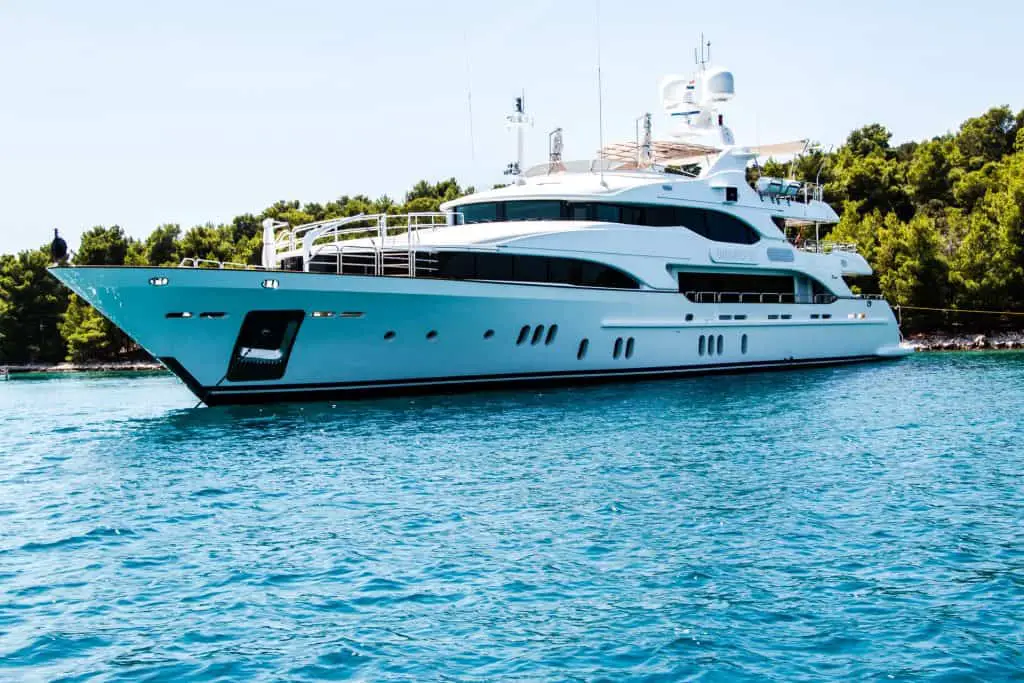
In the wonderful and often luxurious world of yacht ownership, brokers have managed to make a handsome living off of the sales that happen within the industry. These guys facilitate the purchase and sale of yachts, helping with negotiations, inspections, and deliveries to ensure a successful transaction.
And because it’s really no secret how expensive a yacht can be, lots of people assume that yacht brokers make big bucks. But do they? If you’re curious whether you should dip your feet into the cut-throat yacht dealership industry, here’s a sneak peak of what you might own as yacht broker salary.
How Much Does a Yacht Broker Make on Average?
Remember that brokers make money depending on their sales. That is, the more they sell, the more they make. However market studies have found that most yacht brokers will make up to $120,000 a year , especially if they work with high end clients that deal with expensive yacht models.
But although it is possible to make over a hundred grand in a year, it’s not too common. The average salary for a yacht broker actually rests at just under $70,000 a year. That puts them at a weekly salary of about $1,300 to $1,400.
How Much Does a Yacht Broker Make on Commissions?
It’s not easy to find a yacht buyer or seller, and it’s even harder to go through the technicalities of the sale including negotiations. So by stepping in and taking responsibility for the nitty gritty, brokers earn a commission for doing the legwork while the seller enjoys the profits.
The commission percentage itself is not set in stone. Usually, the broker and the seller will decide the size of their cut before the sale happens. The typical commission will see the broker earning around 10% of the sale price . But again, it’s not all that simple.
For starters, there’s what they call ‘net commission’. This simply means that the broker will earn a fixed amount, regardless of whether negotiations change the price of the yacht. For instance, if they’re promised $20,000 in net commissions, they’ll earn exactly that whether or not the yacht sells for its original estimate.
This can be a good deal in case the yacht’s value decreases during appraisal and negotiations. However in the scenario that the yacht sells for more than the original estimate, the broker is left with a fixed commission that will not increase along with the sale price.
They also have the option to go with a percentage commission. As its name suggests, the percentage commission earns you a fixed percentage of the sale price. That is, a yacht that sells for $150,000 will provide the broker with the agreed percentage commission prior to making the sale.
If the seller agreed to a 10% commission, that earns the broker $15,000. In cases when it’s anticipated that the yacht might sell for more than the original estimate, this can be a good deal. But in the event that the watercraft sells for less than the estimate, the broker’s commission also takes a hit.
What are Split Commissions?

Remember that there are two kinds of brokers - the ones hired by the sellers, and the ones hired by the buyers. Obviously, this can complicate the whole commission picture since there are two brokers in the picture.
The listing broker is the guy who helps the seller find a buyer. The selling broker is the one who tries to look for a yacht for sale so his buyer can seal the deal. Most of the time, these guys will take part in a single deal. So what happens to their commission?
Simple -- they split it 50-50. So if the seller decides on a percentage commission at 10%, the brokers will not receive 10% each. Instead, they go halfsies on the 10% commission, which essentially means that they get 5% each.
When Do Yacht Brokers Get Paid?
Sellers don’t want to shell out their money on expensive commissions when they haven’t guaranteed a sale yet. So it’s only fitting that yacht brokers get paid only when the sale has been successfully completed. That means that the buyer should have paid the amount in full before any commission is tendered.
Keep in mind that the yacht industry is for high rollers only. So it’s really uncommon for buyers to take out a loan to pay for their yacht. Most of these buyers pay for their yachts out of their own pockets. That means sellers can get the full amount they expect within a few days or weeks of shaking hands on a deal.
How Much Do Yacht Charter Brokers Make?
There are people who own yachts or super yachts , but don’t really intend to use them for personal enjoyment. These individuals use their yacht as an investment, renting it out to private individuals or companies who want to charter their yacht with a crew .
A yacht charter broker is the guy who helps owners and renters find each other and strike a deal. Keep in mind though that this is a completely separate job from that of a yacht broker . But some brokerage companies will have brokers who perform both roles.
Most of the time, those who work as yacht charter brokers have the potential to earn more since they’re dealing with massive super yachts that can be rented out multiple times in a year, versus a single yacht sale that sort of closes any potential to earn again off of the same watercraft.
What Are the Highest Paying Cities for Yacht Brokers?
Needless to say, not all locations offer reasonable returns for yacht brokers. So if you were hoping to maximize the gains of your efforts, you might want to consider moving to one of these cities that pay the highest for yacht broker services:
- San Jose, California
- Oakland, California
- Tanaina, Arkansas
- Wasilla, Arkansas
- Hayward, California
- Jackson, Wyoming
- Norwalk, Connecticut
- Seattle, Washington
- Vallejo, California
- Concord, California
If money was no object and you don’t really mind leaving behind the life you know and love, then you might want to consider places like the French Riviera, the Greek Islands, or Costa Smeralda, Italy. These places have become exceedingly popular for their lively yachting industry that also makes a great place for a broker hoping to earn a pretty penny off of a sale.
Tips on Becoming a Yacht Broker
Maybe the potential for earning big bucks has you feeling keen on making that career change. But before you decide on actually becoming a yacht broker, there are a few things you might want to take into account to guarantee your success. Here are a few tips on becoming a yacht broker to increase your chances of snagging those sales:
If you’re not familiar with yachts already, now would be the perfect time to brush up on your knowledge. You would expect a car salesman to know what he’s talking about, down to the very last detail of each model and brand of car that he deals with. So the same goes for a yacht broker.
Read up on the different yacht models and brands, and try to find out what each of their selling points might be. If you can, try to see each boat in person to get a better feel of how it performs, and what it might lack that could affect the buyer’s decision.
Look for Certification
Not all states require certification or licenses for yacht brokers, but that doesn’t mean you shouldn’t get one. Those who have these certificates under their belt are in a better position to earn bigger bucks since sellers and buyers feel more comfortable dealing with someone who knows the ropes -- and has the paperwork to prove it.
The Certified Professional Yacht Broker certification isn’t required in any state, but provides aspiring yacht brokers a wealth of knowledge that they can use to provide polished professional assistance to those who might need their services.
Work with Another Broker
Most of those who wiggle their way into the industry first work as an apprentice for another yacht broker. Hanging around someone who has the contacts and the experience should put you at an advantage of learning the ins and outs much faster and more efficiently.
In fact, most people might have to work with another broker for several years before being able to stand on their own two feet. This can also be especially helpful for those who might not have any experience in sales, since the exposure provides much needed understanding on the specifics of negotiations and persuasion.
Get Ready with Your Sales Talk
A yacht broker salary can definitely lure in anyone looking to earn big bucks. But more than just the pay, simply working with the sale of such luxurious watercrafts can make you feel like you’re living the high life alongside those celebrities and public figures that you work for.
No doubt, the yacht broker life can be pretty opulent. And while there might be a bit of a struggle at the start, there’s a whole lot of potential for those who play their cards right and learn what they can from the veterans in the business.
Related Posts
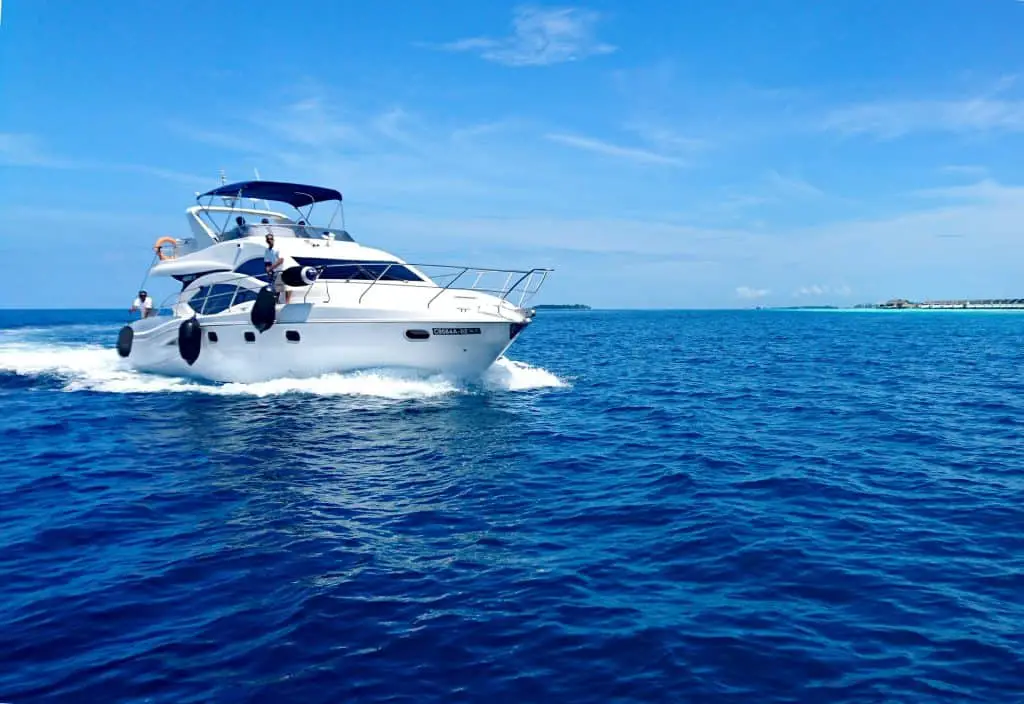
Can I Pilot My Own Yacht? Qualifications & Licenses

How Long Can a Yacht Stay at Sea? All You Need to Know

Best Life Jackets for Sailing [Top 7 Reviewed] in 2023

Why Do Yachts Have Black Sails? [The Reason Explained]
ACTIVE STORM TRACKER Hurricane and Tropical Storm Information Learn more

Service Locator
- Angler Endorsement
- Boat Towing Coverage
- Mechanical Breakdown
- Insurance Requirements in Mexico
- Agreed Hull Value
- Actual Cash Value
- Liability Only
- Insurance Payment Options
- Claims Information
- Towing Service Agreement
- Membership Plans
- Boat Show Tickets
- BoatUS Boats For Sale
- Membership Payment Options
- Consumer Affairs
- Boat Documentation Requirements
- Installation Instructions
- Shipping & Handling Information
- Contact Boat Lettering
- End User Agreement
- Frequently Asked Questions
- Vessel Documentation
- BoatUS Foundation
- Government Affairs
- Powercruisers
- Buying & Selling Advice
- Maintenance
- Tow Vehicles
- Make & Create
- Makeovers & Refitting
- Accessories
- Electronics
- Skills, Tips, Tools
- Spring Preparation
- Winterization
- Boaters’ Rights
- Environment & Clean Water
- Boat Safety
- Navigational Hazards
- Personal Safety
- Batteries & Onboard Power
- Motors, Engines, Propulsion
- Books & Movies
- Cockpit Confessions
- Communication & Etiquette
- Contests & Sweepstakes
- Colleges & Tech Schools
- Food, Drink, Entertainment
- New To Boating
- Travel & Destinations
- Watersports
- Anchors & Anchoring
- Boat Handling
- ← Boats & Tow Vehicles
What A Yacht Broker Can Do For You
Advertisement
Especially when buying or selling a large boat, the right broker can reduce stress and make the transaction go smoothly and painlessly.

A broker can take the complications out of buying or selling your next boat. (Photo: Michael Vatalaro)
When BoatUS member David Issacson bought his first boat 26 years ago, he searched the newspaper classifieds in the morning (remember those?), located a couple of candidates before noon, and by 3 p.m. wrote the seller a check for $1,000 for a 17-foot boat he took fishing that day. "It was so simple then," he says. "Pretty much like buying a cheap used car. I don't even think I got a bill of sale. It was all done with a handshake." Now that he's retiring, he's looking for his fourth boat, which he says will be much bigger, probably in the 42- to 45-foot range. "I have no idea what it's going to take now. I've never had a boat that was documented or had a loan on it. I don't even think they have classifieds in the paper anymore, and I'm not sure what the process is these days."
Issacson is exactly the type of person who could benefit from using a boat broker. Boat brokers are similar to real-estate agents, but with important differences: They're far less regulated, and their commission is 10 percent rather than six percent. Unlike realtors who must take classes, sit for an exam, and be licensed in every state, only boat brokers in Florida and California have to be licensed and only California requires an exam. In most other states, anyone can call themselves a boat broker. And while all brokers have certain legal responsibilities to their clients, selecting one should be done carefully. Ask around at your marina or boatyard and get referrals from others who have used a broker before. Talk to two or three and get a feel for them, just as you would with a real estate agent. One way to increase your chances of finding the right broker is to look for a Certified Professional Yacht Broker (CPYB). These brokers are members of the Yacht Brokers Association of America (YBAA), have taken a comprehensive exam, have pledged to abide by a code of ethics, and will work with the BoatUS Dispute Mediation Program (see links in sidebar).
If You're Selling
There are several advantages to using a broker, the biggest of which is exposure. Plastering "For Sale" signs in yacht clubs and marinas can't equal the power of a broker's listing, especially with larger boats that have a smaller pool of buyers who may not even be in the same state. Brokers typically list boats through websites such as Yachtworld, which is easily searchable by anyone, anywhere in the world. Only brokers can list boats on the site, which functions much like the Multiple Listing Service for real estate agents.
Here's How A Broker Can Help
If you're the seller, a broker will:.
- Advertise your boat. Brokers should list your boat on Yachtworld and advertise in other places where appropriate. Find out what their marketing plan is and get it in writing.
- Price your boat realistically. Brokers have access to recent sale prices and know a good starting point.
- Prescreen responses to advertising. This will avoid most tire kickers.
- Show your boat to prospective buyers. This will save you from wasting time with buyers who don't show up.
- Communicate all offers from potential buyers to you.
- Negotiate the selling price. This is where brokers can really earn their money.
- Draw up sales agreements and accept deposits. Many brokers can do this electronically over computers, tablets, and even smartphones.
- Arrange for sea trials and schedule surveys.
- Coordinate closing.
- Transfer funds to you. Now you can start shopping for your next boat.
Correctly pricing a boat is critical to getting it sold, and an experienced broker has a very good idea of what a boat will sell for and can price it accordingly. Brokers typically have access to what similar boats have sold for in the local area and they'll prepare a listing based on the kind of boat and type of buyers expected. They'll take photos, write an enticing description, and recommend things to improve the look and marketability of your boat. Brokers can also help you navigate some of the more confusing aspects of selling such as corporate ownership, loan payoffs, bills of sale, and other documents needed for transferring ownership. Aside from listing and advertising the boat, their most important job is helping move the process along once a buyer is found. Brokers can also help a buyer obtain financing and assist with changing the USCG documentation. While the 10-percent commission is usually not negotiable, brokers will sometimes discount it for a sale that might be falling apart because of a survey report or other defects found on a boat. The different listing contracts used by brokers can be confusing, but they're not complicated once you understand the two main types, a central agency agreement and an open listing agreement.
A central agency agreement (sometimes called an exclusive listing) means you've hired a specific broker to sell your boat. With this type of agreement, the broker typically lists your boat on Yachtworld and — this is important — is obligated to sell it through a co-brokerage arrangement. Co-brokerage means that if another broker finds a buyer for your boat, your broker agrees to split the commission with him. This incentive to help each other is why about 70 percent of all brokerage sales are co-brokered. Keep in mind, though, with this type of agreement, even if you bring in the seller or end up donating your boat, you'll still be liable for the broker's commission. The majority of brokerage sales are central agency agreements.
An open listing agreement means you've given more than one broker the right to sell your boat and you also retain the right to sell it on your own. The disadvantage is that because no broker is guaranteed at least a part of the commission, it's not very likely any of them will spend the money to list your boat on Yachtworld or pay for other advertising. There can also be confused communications between multiple brokers and potential buyers. On the other hand, a hungry broker may be more motivated to bring you a buyer because he would get the entire commission. With this type of agreement, if you find your own buyer, you don't owe anyone a commission. For either type, don't be pressured into signing for a longer term than you're comfortable with. Six months is typical, but don't be afraid to ask for less, though a broker typically needs at least a couple of months to generate interest. Usually, you can walk away from any contract after giving 30 days notice. Most agreements automatically renew, so give notice before that if you want to cancel. No matter what kind of listing, ask for biweekly progress reports.
Selling It Yourself
For Sale By Ow ner (FSBO) certainly sounds attractive. Not only do you pocket 10 percent more than if you used a broker, but you're in charge of the whole process. Selling it yourself has drawbacks, however. You won't be able to get the same kind of national exposure a broker can, and you'll be responsible for keeping the boat in top condition and available for showing. And, because most boat shopping occurs on weekends, expect to be tied down during your time off. Finally, like many others, you may simply dislike negotiating. But if you want to save some serious money, BoatUS can help. Our thousands of online classified listings are viewable by anyone, anywhere in the world, and we offer an escrow service that takes the anxiety out of the financial part of the transaction. We also offer members full documentation service, boat financing, comprehensive insurance, and on-water and roadside towing coverage.
If You're Buying
While owners may find the process of selling to be an anxious one, buyers are looking for their next dream boat and are likely to be enjoying looking around, trying to find the perfect fit. But buyers tend to get apprehensive once it comes to plunking down hard cash. This is where a broker can make the process less stressful. Brokers should have a separate bank account for holding deposits and there should be wording in the contract specifying what the sale is contingent upon as well as how and when the money will be returned if the sale falls through.
It's important to remember that the broker in a typical sale is getting paid by and working only for the seller, not the buyer. A broker will try to get the highest possible price (that's what his commission is paid from) and will try to sell his client's boat even if it's not necessarily the best deal for you. You're on your own with negotiations and paperwork advice. You can, however, enter into an agreement with a broker through a buyer's broker arrangement. A buyer's broker will represent you, not the seller. Once they know what you're looking for, they can scour their sources and suggest likely boats for you to view, assist in negotiating a price, and help with the paperwork. Typically, a buyer's broker gets a commission split from the seller's broker so there's no cost to you, but read the agreement before signing.
When it's time to seriously consider a boat, it will need to be hauled out and surveyed — something that's usually paid for by the buyer, though as with anything in a sale, that's negotiable. Never use a surveyor recommended by the broker or seller; it's critical to hire an independent, qualified surveyor (see links, below) who has no stake in the outcome. Not only will the survey uncover needed repairs and deficiencies, it will also establish a fair market value, all of which can be used for negotiations. It will almost certainly be needed for financing and insurance as well.
Useful Links
- Finding a Certified Professional Yacht Broker
- Find a Marine Surveyor
- BoatUS USCG Documentation Service
- BoatUS Financing
- BoatUS Insurance
- Find out if a Florida Broker is licensed
Related Articles
The truth about ceramic coatings for boats.
Our editor investigates the marketing claims of consumer-grade ceramic coatings.
Fine-Tune Your Side Scan Fishfinder
Take your side-scanning fishfinder off auto mode, and you’ll be spotting your prey from afar in no time
DIY Boat Foam Decking
Closed-cell foam flooring helps make boating more comfortable. Here’s how to install it on your vessel
Click to explore related articles
Charles Fort
Contributing Editor, BoatUS Magazine
Charles Fort is BoatUS Magazine's West Coast Editor. He often writes local news items for BoatUS Magazine's Waypoints column and contributes to Reports, in-depth tech features in every issue written to help readers avoid accidental damage to their boats. He is a member of the National Association of Marine Surveyors, he's on ABYC tech committees, and has a 100-ton U.S. Coast Guard license. He lives in California.
BoatUS Magazine Is A Benefit Of BoatUS Membership
Membership Benefits Include:
Subscription to the print version of BoatUS Magazine
4% back on purchases from West Marine stores or online at WestMarine.com
Discounts on fuel, transient slips, repairs and more at over 1,200 businesses
Deals on cruises, charters, car rentals, hotel stays and more…
All for only $25/year!
We use cookies to enhance your visit to our website and to improve your experience. By continuing to use our website, you’re agreeing to our cookie policy.

What Do Yacht Brokers Do? 8 Things To Expect (Selling & buying)
From buying to selling boats and enjoying life on the high seas, the exciting life of a yacht broker seems like a dream to many.
What exactly is involved in their job?
This article will highlight some of the key responsibilities of a yacht broker.
Table of Contents
The 8 Main Functions Of Yacht Brokers

A yacht broker helps to make sure that everything goes smoothly behind the scenes of buying and selling a yacht.
They do a lot to help to make sure the stress of buying or selling a yacht is less stressful and can help to speed the process up.
1) Looking at the Boat
Whether the client is purchasing a boat or selling one, the yacht broker will first need to view the vessel.
This is in order to get a good idea of the condition of the yacht. He or she will need to appraise the condition of the boat.
Another responsibility is to talk to the crew about the maintenance schedule. The yacht broker will also need to look at the ship’s papers. Having all of the right certificates in order and documents is crucial to sealing the deal.
2) Appraising the Boat
The yacht broker will also want to talk to his industry contacts to get an idea for how much the yacht is sold for.
The yacht broker has the important job of saving the seller or buyer time and pain when it comes to selling a boat.
A yacht broker can help with assessing the boat and surveying it to make sure it is in premium condition. They will attend the survey with you, or for you, if you are not able to. The broker will act as the intermediary during the process of the sale.
3) Filling Out The Paperwork
The yacht broker’s job is to make sure that the paperwork gets done. This includes collating the documents for the actual closing of the sale, preparing technical specifications, to making sure the yacht has all of the appropriate certificates.
They will also guide the yacht owner through aspects such as loan payoffs, corporate ownership, bills of sale, and similar documents.
4) Briefing The Parties Involved
A yacht broker will need to direct clients to the best possible marine lawyer for their specific yacht.
The yacht broker may need to help encourage the deal to keep pushing through.
5) Marketing
Marketing is an essential part of the yacht broker profession, especially when they are representing the seller of a yacht.
In the past, a yacht broker operated out of a big office building, and people would walk by and visit because they were considering purchasing a yacht.
Now, in the era of the internet, people from all over the world have access to a yacht broker and their services.
The yacht broker may make use of advertising such as banner ads or videos. Marketing yachts effectively makes use of the internet, so a yacht broker may make posts on social media, classifieds, or their personal website to sell a yacht or find one.
Some yacht brokers might make a video walk-through of the yacht and explain the features to potential clients. Others will have a professional website that acts as a point of contact.
6) Duties While Selling
As stated above, the broker will list the yacht on Yachtworld and other appropriate outlets. They also have the responsibility of pricing the yacht reasonably. Brokers will have access to recent sales, and they know how much they should go for based on recent sales prices.
When they receive responses to the yacht adds, they will prescreen responses so as to find those that are most likely to lead to a sale.
A yacht broker will also have the duty of showing the boat to people who are interested in buying it. They’ll give them the tour, and be sure that the boat is in pristine condition.
The yacht broker will also answer any questions that the buyers have.
Another responsibility they have is to communicate negotiations with the yacht owner. They will also handle the pricing of the yacht , which is where they might get their earnings from.
Finding the right price is a big part of getting the boat sold.
Part of their job would be to take pictures of the boat and to write a description of it that entices buyers.
7) Securing the Sale

When a price is agreed upon, the yacht broker will draw up the sales agreements and will also accept deposits.
Modern technology allows them to do this electronically with smartphones, tablets, and computers.
A yacht broker will secure sea trials where the potential buyer will take it for a test drive on the water as well as schedule surveys.
After the sale is made, they will transfer the funds to the yacht owner.
A yacht broker can assist a buyer in getting financing for the yacht.
8) Duties After the Sale
The broker’s job doesn’t stop after the boat is sold.
They can also assist in docking, boat detailing, and refining it to meet the buyer’s needs.
Their industry connections can help a lot in this process after the boat is sold, and helps to make boat ownership a rewarding experience.
Types of Agreements With Yacht Brokers
Some yacht brokers take a 10% commission on the sale of the boat and might bring it down in order to secure a sale on a boat. There are different types of agreements.
A central agency agreement, or an exclusive listing, means that a seller has hired a specific broker to sell their boat.
The broker may then list it on Yachtworld or a similar site. They then enter a co-brokerage agreement. Co-brokerage is when another broker finds a buyer for the yacht, and the original broker splits the commission with them.
Almost 70% of all yacht sales are done in this way because of this incentive. In this agreement, even if an owner brings in a buyer or donates the boat, they are still liable to pay the broker commission.
Most of the yacht sales are completed with a central agency agreement.
Another type of sale is the open listing agreement. In this setup, the owner can bring in more than one broker for the sale.
The owner also retains the right to sell the yacht on their own.
A disadvantage to this type is because they are not guaranteed commission, they might not spend money that is necessary to advertise the boat. It also might result in communication errors among more than one broker and prospective buyers.
However, on the other hand, a motivated broker might be more likely to bring in a sale because then they would be guaranteed the entire commission. The typical length of the agreement is around six months.
Yacht Broker Duties If You Are Buying
Brokers help to ease buyer’s anxiety when putting down large amounts of cash for a luxury yacht.
They might set up a separate bank account for the transaction and the necessary deposits.
The contract will specify what the contingencies of the sale are, and also how much or how the money will be returned if the sale does not go through.
For the buyer, the yacht broker will have the advice they need to find the right boat at the right price. They’ll be able to open doors and find opportunities that benefit both parties and create a win-win situation.
They work as an advocate on behalf of the buyer and will be priceless when it comes to negotiating and securing a sale.
Know The Role Of The Broker
In most sales, the broker is a worker for the seller and not the buyer.
This is an important part to remember. Their job is to get the highest price possible to satisfy the buyer and to make money. It is possible for a buyer to enter into an agreement with a broker with a buyer’s broker agreement.
A buyer’s broker represents the buyer, not the person selling the boat.
When they know what type of yacht the buyer is looking for, they will search for it through their contacts and resources available to them. They will assist in finding the right boat for the buyer’s needs and budget as well as assist in the necessary paperwork.
A buyer’s broker will typically get a split in commission from the seller’s broker.
There may be no cost to the buyer for using a buyer’s broker, but be sure to read the details of the agreement before signing.
A yacht broker has priceless industry knowledge that will assist in the buying and selling of yachts. A trustworthy broker will help save buyers and sellers time and money when they are making the purchase. They’ll pool the talents and resources of a team of brokers to support the transaction go quickly and smoothly.
Finding the right yacht broker with experience and integrity will make a big difference in the process. A yacht purchase is a significant investment, and teaming with the right people helps to ensure that the investment is the right one.
They understand the market and all of the nuances involved in buying and selling.
Click to share...

By SuperyachtNews 06 Apr 2017
Transparency on broker commission rates needed
It’s important that buying brokers are aware of non-standard commission rates at the earliest point in a sale….

Do brokers earn enough commission to market yachts effectively, or do they earn too much commission? This question inherently divides opinion; owners bemoan exorbitant rates, while brokerage firms will attest that every last penny is spent thriftily on a yacht’s promotion.
“The brokerage market does not have a good avenue for brokers who are signing CAs to advise the industry as to whether the boat is being listed for sale with a standard, or non-standard [lower], commission rate,” explained Northrop & Johnson sales broker, Cromwell Littlejohn, speaking to SuperyachtNews at the Palm Beach International Boat Show.
The standard commission rates are MYBA’s ‘sliding scale’ – 10 per cent on the first $10 million of value, 5 per cent on the second $10 million, and 2.5 per cent on anything above – and the US structure, which is 10 per cent of the gross sales price.
“It causes problems because a broker may show his client a boat, and the client might love it and start making offers, but the broker may not be aware that there is a reduced commission until later in the negotiation.” A non-standard commission rate, if disclosed, will make a listing less attractive for buying brokers and reduce the number of viewings – as such, selling brokers may choose to conceal such information.
“There are many brokers who, in today’s market, can play in segments of the industry they have no experience in,” Littlejohn continues. “A broker might be representing a buyer for the only boat he’s ever going to sell in that size range, so if he finds out the commission rate for a boat is reduced, he’ll just take his client to a different boat. And how would he do that? He would just poison the boat his client was interested in, with misinformation or misleading information.”
Littlejohn’s caveat to this, however, is, “Will a $150 million boat be at a 10 per cent commission rate? No. Or on the sliding scale? No. But, when you take the $250,000 listing, it’s very tough to do your job without the standard structure."
Many will believe that brokers should represent their clients no matter what the commission – and while Littlejohn agrees with this, he adds: “If someone says, ‘here’s the perfect boat for your client, but you’ll make nothing if you sell it’, is that the perfect boat? I’d love to do this for fun and not need a commission, but there has to be a happy medium there.”
Are sellers almost inadvertently setting their brokers up for failure by negotiating a non-standard commission rate prior to a deal being on the table? Industry standards are there because they reinforce best practice – this must be conveyed to sellers.
Profile links
Northrop and Johnson
Join the discussion
To post comments please Sign in or Register
When commenting please follow our house rules
Click here to become part of The Superyacht Group community, and join us in our mission to make this industry accessible to all, and prosperous for the long-term. We are offering access to the superyacht industry’s most comprehensive and longstanding archive of business-critical information, as well as a comprehensive, real-time superyacht fleet database, for just £10 per month, because we are One Industry with One Mission. Sign up here .
Related news

Careering after a fair market value
Are too many genuine sellers falling into a buyer-less void left by ‘not-serious’ sellers?
8 years ago
Sign up to the SuperyachtNews Bulletin
Receive unrivalled market intelligence, weekly headlines and the most relevant and insightful journalism directly to your inbox.
Sign up to the SuperyachtNews Bulletin
The superyachtnews app.

Follow us on
Media Pack Request
Please select exactly what you would like to receive from us by ticking the boxes below:
SuperyachtNews.com
Register to comment
Frequently asked questions Yacht Brokerage
Advertising strategies for yachts, how to determine the asking price, why exclusively use a brokerage house to list a yacht for sale, sea trial and survey - how they work, what is involved in the administration of selling a yacht, how to make an offer on a yacht , what does a yacht broker do, what is a broker's involvement in after-sales, how do brokers deal with enquires, what is a broker's role to a yacht buyer.
Most brokerage houses have a standard outline plan of how a yacht is to be advertised in the most appropriate media. A broker�s objective is to devise a strategy with the best chances of reaching the most qualified audience for each yacht category. Common methods are e-marketing, online listing access for public viewing, yacht shows, print media, using in-house databases of clients, brokers and representatives all combined with professional "knowhow".
To ensure an appropriate sale, it is essential to ask a fair price. A broker can help establish fair-market value for the yacht through access to actual sold yacht data that is not available to the public.
Yacht broker�s work hard to generate interest and enquires for their yacht listings. They also protect and promote the principles of their clients. Most brokers sign a "Central Agency Agreement" with the owner/seller, providing a secure arrangement between all parties. Brokers will also work co-operatively with most other brokers on a co-brokerage basis. Yacht brokers charge a commission when the yacht is sold, and the commission amount would have been set in writing in the Central Agency Agreement. If another broker brings a buyer to the table on a co-brokerage arrangement, the total commission will normally be shared between the brokers.
A buyer of a pre-owned yacht will usually request a sea trial and the services of a marine surveyor. Buyers pay for the surveys and for hauling the yacht out of the water for inspection. The Broker will usually attend the sea trial and marine survey with their buyer to help determine how to properly address any yacht survey issues and put the problems in context. Part of this includes; estimating time and cost of rectifying and where to obtain accurate quotes for items that are unfamiliar. The Insurance Company will usually require a copy of the survey.
Brokers are familiar with all the paperwork requirements from the initial Offer to Purchase and Bill of Sale to licensing and registration; to paying tax, certificates of ownership, security agreements, and other documents needed to complete a sale. They also understand maritime and admiralty laws for the type of yachts they represent, as well as agency contracts, listing agreements, closing statements, deposit requirements and escrowed accounts to safeguard funds.
Brokers will help their buyer decide on a realistic figure to offer which will increase the chances of buying a yacht for a fair and reasonable price, and together with the necessary elements to protect interests. Once this is done, the broker will prepare a "Letter of Intent or Letter of Offer" ready for the buyer to sign. This document will display the terms of the sale including obligations that you and the seller have agreed to, and when these obligations will be fulfilled. The buyer should then make a good-faith deposit on the yacht, usually placed in escrow, and subject to sea trial and survey.
Most yacht brokers work in a similar way to estate agents. They are representatives consulted to find and purchase yachts, as well as appointed to list, represent, and sell yachts. Traditionally, the seller pays the commissions that a yacht broker earns, yet brokers have a duty to both buyer and seller in every transaction.
Once a yacht is purchased the broker will guide their client through the next stages such as; finding a berth, yacht maintenance, repair specialists, yacht handling, seamanship, sourcing yacht crew, charter management and all other after-sale fundamentals to complete the service package.
A professional broker will listen closely to your requirements and will help you determine if the yacht you are considering is the right yacht, at the best value. Brokers can objectively tell you about the condition of the yacht before you decide whether or not to spend your time inspecting it. They will source and compare similar yachts on (and off) the market, the history of the yacht, how long it has been on the market, and the motivation of the seller. Anyone can look up asking prices on yachts, but it takes a professional broker to have an intimate knowledge of current market conditions, a familiarity of similar yachts, and information on recent sale prices and time on the market through industry resources not available to the public.
Pre-owned yachts are either a "central agency listing" of a yacht broker, or a trade-in from a new yacht dealer. If you are interested in a broker's listing or a trade-in, the listing broker or dealer is likely to know the yacht inside and out. They have been selected by the owner/seller to exclusively represent this yacht and all enquiries must go through this yacht broker or yacht dealer. If you are not already working with a yacht broker, and if you find a yacht on the market of interest, you should contact the listing broker directly. However a more rewarding option might be to select a yacht broker of your own, and consult with that broker about all of your yachts of interest, and let that broker represent you in your enquiries and transactions.

How To Become A Yacht Broker

I consider becoming a yacht broker one of the best decisions I have ever made.
In 2016 I jumped feet first into the yacht, boat, and ship brokerage industry with little experience but with incredible passion. Selling yachts was my first job out of college and is still my only post graduation job, aside from working on this website and building other websites.
I even turned down a job offer from Google to work in the yacht industry!
One of the many benefits, in my opinion, of being a yacht broker is that the job is semi seasonal. While the definition of seasonal will change depending on where you work, not being busy for the full 12 months allows me time to offshore fish, build websites , travel, and much more.
How I Became A Yacht Broker
While in college I started a drone photography and videography business as drones, at the time, were still new to market and the barrier to entry was high.
I started by filming short video clips for car dealerships and real estate agents, but I wanted to incorporate my passions of saltwater fishing and yachts with photography.

One day I cold emailed the most reputable “fishing centric” yacht brokerage in San Diego, California and offered my drone services free of charge. Fast forwarding, this free video offer lead to monthly paid work for over a year. During this year period I was becoming more immersed in saltwater fishing and built up a small following on social media.
Upon graduating from college, I approached the owner and asked for a sales position at the brokerage, to which I was added to the team immediately. Over the last 9 years, I have been responsible for the sale of over $60 million in yachts and boats.
How Much Does A Yacht Broker Make?
Researching the compensation for a particular industry or position is important before making a career move.
In most cases, a yacht broker is not paid a salary, rather paid solely on commission. The standard industry commission is 10% based on the selling price of the vessel. This means compensation can range from $100,000 to over $1 million per year.
In my experience, the harder you work the more you will earn as the job is purely commission. There will be months, or several months, where you don’t bring home any income, but when the season is in full swing you will be glad you’re paid on commission and not salary.
Yacht Broker License Information
It’s fairly easy to become a yacht broker or a yacht salesperson. These terms often get lumped together as the same, however a broker owns the company where the salesperson “hangs” their license under.
Only two states in the United States required a license to sell yachts and boats. Florida requires a license for those selling vessels over 32’ that are not their own, and California requires a license for those selling vessel over 16’ that are not their own. The other 48 states are more lax, so I would suggest speaking to a local brokerage in your state about their rules.

How You Can Become A Yacht Broker
Nearly anyone can become a yacht broker or a yacht salesperson, but not everyone will succeed at the job. Below is a list of traits and actions that can help you get into the category of yacht brokers who earn a substantial living.
1. Be Driven
As mentioned earlier, this job is purely commission based so you need an excellent work ethic and a “go getter” attitude in order to generate income. Yes you can sit back and not do much work, but when starting out and building your client base, this will lead to lackluster results. Be willing to walk the docks, advertise, leverage social media, and look for opportunities to spread your name and services.
There will be some months where you don’t earn any money, just know that this will happen and be prepared. Have some money set aside to get through the slow times, but on the contrary, when the market is on fire, the sales come quick and steady.
In any business, honesty is vital for longterm success. Boats and yachts have countless systems and nuances, so when asked a question you don’t have the answer to, simply say you do not know but will find out. Follow up with your client the same day with the answer.
When it comes to negotiations, stick to your guns and don’t become intimidated. There is a time and place to offer a reduced commission or to help bridge a survey allowance gap, but don’t make this your automatic go to.
2. Have A Passion For Boats and Yachts
Your body language and attitude, whether intentful or not, will be analyzed by prospective buyers and sellers, and if you don’t show passion for what you’re talking about, then this will be apparent.

Many buyers and sellers have chosen to work with me because they could sense my drive and passion for their needs. I highly encourage you to be genuinely excited to show or preview a vessel because you can always learn something new, plus the water is your office…it doesn’t get much better than that.
Having prior sales experience will be helpful in making a seamless transition into the yacht sales industry, but I’ve found it’s not a requirement. As your deal flow increases, transactions will become easier but for the first year or two there will be a lot of learning moments throughout the sales cycle.
When starting out, take as many listing as you can to get experience learning about different boat platforms and brands, as well as work out all the kinks that can arise during negotiations, paperwork and closing.
3. Excellent Communication and Follow Up
This section separates excellent brokers from mediocre brokers. While this may be the most important aspects of the job, I think it requires the least amount of text.
- Always tell the truth and be honest…if an unpleasant conversation needs to be had, do it quickly and with a phone call opposed to sending an email
- Always stay in contact with your clients…whether they are a prospect, in contract on a boat, or a past client, maintain contact often
- Follow up early and often…be preemptive in your communication, pre addressing and questions before they become questions…a simple text message or two sentence email with an update is often all that is needed for your client to instill additional trust in you
4. Contact Local Yacht Brokerages For An Open Position
Once you have a good understanding of what you’re entering in to, it’s time to start looking for a brokerage to work under.
If you’re totally new to the industry, I recommend using Google to find reputable brokerages in your area, or you can see which brokerages advertise in the back of Yachting Magazine or Marlin Magazine for example.
For those with some experience within the boating industry, you should have somewhat of an idea of which brokerage houses are the most reputable in your area.
There is no better way to land a job than walking in and asking to speak to the owner or manager. Bring a resume and be prepared if the decision maker wants to talk right then. Even if a position isn’t available today, stay in contact via email so that when an opening does occur your name comes to mind.
Selling yachts for a living has offered me many opportunities that I could have never had without this employment. If you’re ready to work hard, then I encourage you to take the plunge immediately. The first 12 months will be difficult, but after that the learning curve begins to flatten.

Related Articles

How To Create A Profitable Niche Website In 2024

[2024] 100+ Sharing Economy Apps and Websites You Don’t Want to Miss

[2023] 100+ Ways to Make Money in Your Spare Time

How To Rank Website Content On The First Page Of Google
Leave a reply cancel reply.
Your email address will not be published. Required fields are marked *
Notify me of follow-up comments by email.
Notify me of new posts by email.
- Currency: USD | EUR

Who pays the commission amount to the broker, and how much is it?
The commission is paid by out of the yacht charter fee to the yacht charter broker. Sometimes the yacht will give a discount on a week they want to sell or for repeat guests. Same with a broker.
They may offer a bit off their commission back to repeat clients or add in extras that the yacht does not cover. The commission rate is fairly standard throughout the industry. The yacht pays 15% to the broker on average, sometimes a bit more or less, depending on the week. It could be a bit more if you have a Travel Agent you work with as well as the Yacht Charter Broker.
Read more here
- Previous Post Will different Yacht Brokers have different prices for yachts?
- Next Post How do I reserve a yacht vacation?

How much commission does a yacht broker make?
Table of Contents
Yacht brokers play a crucial role in the boating industry, assisting both buyers and sellers in the transaction of luxury yachts. One of the most common questions among those aspiring to become yacht brokers or those looking to engage their services is: How much commission does a yacht broker make? Let’s dive into this question and explore the factors that influence a yacht broker’s commission.
1. What is a yacht broker?
A yacht broker is a professional who acts as an intermediary between buyers and sellers of yachts, facilitating the purchase, sale, or charter of these vessels.
2. What determines a yacht broker’s commission?
The primary factor that determines a yacht broker’s commission is the final selling price of the yacht. Typically, the commission is a percentage of the final sale price, and this rate can vary.
3. How much is the typical commission rate?
While the commission rate can differ, it is customary for yacht brokers to receive a 10% commission on the final sale price of a yacht. However, this rate can be negotiable and may vary depending on various factors.
4. Are there cases where the commission rate deviates from 10%?
Yes, there are instances where the commission rate may deviate from the standard 10%. Factors like the type, size, and value of the yacht, market conditions, and the relationship between the broker and client can influence the commission rate.
5. Can the commission rate change within the same transaction?
In some cases, there may be a tiered commission structure in place. For example, the commission rate might be 10% on the first portion of the sale price and 5% on any amount exceeding that. This arrangement incentivizes brokers to strive for higher sale prices.
6. Who pays the commission?
Traditionally, the seller pays the commission to both the listing broker (representing the seller) and the selling broker (representing the buyer). This practice ensures that the buyer’s broker is incentivized to find the best yacht available in the market.
7. Does the buyer have any financial obligations towards the broker?
As a buyer, you do not directly pay the broker’s commission. However, indirectly, the commission is factored into the yacht’s selling price, which is eventually borne by the buyer.
8. Are there any additional fees that the buyer should be aware of?
Apart from the commission, buyers must consider other expenses such as taxes, registration fees, survey costs, and any required repairs or modifications to the yacht.
9. Are all yacht brokers equally skilled?
Yacht brokers, like professionals in any industry, have varying degrees of experience and expertise. It is essential to research and find a qualified broker who has a solid track record in the yacht market.
10. Can a yacht broker represent both the buyer and the seller?
Yes, a yacht broker can act as a dual agent, representing both the buyer and the seller in a transaction. However, the broker must disclose this dual agency to both parties and provide fair and equal representation to each.
11. Do brokers only work with luxury yachts?
While many yacht brokers specialize in luxury yachts, there are brokers who handle smaller boats and vessels as well. It’s advisable to find a broker who has expertise with the specific type of yacht you are interested in.
12. How can I become a yacht broker?
To become a yacht broker, you typically need to obtain the necessary licenses and certifications. Additionally, gaining industry experience and building connections is valuable for success in this profession. Research the requirements in your region and consider apprenticeships or training programs to kickstart your career.
In conclusion, the commission earned by a yacht broker is generally a percentage of the final selling price, typically ranging around 10%. However, various factors can influence the commission rate, such as the size, type, and value of the yacht, market conditions, and negotiation between the parties involved. It is recommended to consult with multiple brokers and clarify the commission structure before entering into a yacht transaction.
Leave a Comment Cancel reply
Save my name, email, and website in this browser for the next time I comment.
Please use a modern browser to view this website. Some elements might not work as expected when using Internet Explorer.
- Why Charter Homepage
- Luxury Yacht Vacation Types
- Corporate Yacht Charter
- Tailor Made Vacations
- Luxury Exploration Vacations
- ALL 3,704 Yachts For Charter
- Motor Yachts
- Sailing Yachts
- Classic Yachts
- Catamaran Yachts
- Special Offers
- by Destination
Yacht Reviews
- Destination Guides
- Inspiration & Features
- Mediterranean Charter Yachts
- France Charter Yachts
- Italy Charter Yachts
- Croatia Charter Yachts
- Greece Charter Yachts
- Turkey Charter Yachts
- Bahamas Charter Yachts
- Caribbean Charter Yachts
- Australia Charter Yachts
- Thailand Charter Yachts
- Dubai Charter Yachts
- Destination News
- New To Fleet
- Charter Fleet Updates
- Industry News
- Yacht Shows
- Corporate Charter
- Charter Advice
- Why Use a Yacht Broker
- Charter Costs Explained
- Add my yacht
- Yacht Charter Fleet
- Luxury Yacht Charter Advice
- Finding Your Yacht Broker

Finding a Yacht Charter Broker
Plan your dream vacation with the help of an industry expert.
A yacht broker is an industry expert who knows everything there is to know about luxury yacht charters. Once you have decided you would like to book a superyacht charter, have a handful of yachts in mind, an idea of what type of charter you’re looking for and who you would like to join you, it’s time to start planning your private yacht charter.
Each and every broker has access to the entire fleet of yachts available worldwide, has stepped on board some of the most luxurious superyachts, met with crew and sampled gourmet cuisine to ensure when it comes to planning you’re yacht charter; they get it right first time, every time.
Why use a yacht broker
Whether you’re planning a luxury yacht charter vacation for the first, second or umpteenth time it is always important to use the knowledge and support of a yacht broker. Although it is optional to use a charter broker, no matter how much you know, or think you know about chartering a yacht, a charter broker always knows more. Although there are many reasons to use a charter broker, in an ever evolving industry there is nothing like the knowledge of an expert to guide you through the process of booking your luxury holiday or corporate yacht charter.
Reasons to book through a yacht broker:
- First-hand experience of superyachts and luxury destinations.
- Knowledge and expertise of the necessary legalities (contracts, escrow accounts).
- Unbiased advice.
- Someone to research and ask questions (even awkward ones) on your behalf.
- Protection in the unlikely event anything should go awry, a yacht broker can provide a buffer between you and the yacht owner.
How to find one you can trust
Making sure your next dream charter is being handled by the right broker is no easy feat. In the same way it is important to charter a yacht which suits your personality and taste it is essential your yacht broker can appeal to the same senses. Not all brokers speak all languages, not all brokers are experienced in each and every yacht on the market, not all brokers have first hand knowledge of each and every cruising destination and their points of interest, and not all brokers are available to organise your charter at once.
These are some of the reasons why an expert team able to offer you the necessary customer support is here to help you. As they accompany you throughout the process and coordinate the planning of your charter with a carefully handpicked selection of the most relevant brokers able to match with you, they bring that additional level of customer service, objectivity, trust, safety and transparency to the process that is especially relevant for newcomers not yet accustomed to the organisation of a yacht charter.
The below professional organisations, popularly known by their acronyms, each acknowledge experienced charter brokers and only allow members to join who are reputable industry experts. With some organisations it is mandatory for brokers to attend a variety of seminars and yacht shows in order to maintain their knowledge of the market. It is possible for a broker to be a member of more than one association though if you are unsure as to which group a broker is part of, do not hesitate to outright ask.
- IYBA - International Yacht Brokers Association
- CYBA - Charter Yacht Brokers Association
- MYBA - Worldwide Yachting Association
- HYBA - Hellenic Yacht Brokers Association
- AYCA - American Yacht Charter Association
In the same way it is important to charter a yacht which suits your personality and taste it is essential your yacht broker can appeal to the same senses. Shop around for a broker who you feel comfortable with, someone who you can voice your honest opinion to when it comes to planning exactly what you want. Find yacht brokers that have contributed to this site in our Contributors section.
How much will a yacht broker cost?
Absolutely nothing. All of these services are at no extra cost to you, as all commissions paid to brokers are included in the package — in other words, whether you decide to make use of our partners’ service , contact a broker or prepare your charter yourself makes no difference to the price tag attached to it.
Find luxury superyachts to discuss with your yacht broker from our extensive luxury yacht charter fleet .
Getting Started
- Understanding Charter Costs
- How To Choose Your Yacht
- Finding a Yacht Broker
- Activities On-Board
- Yacht Charter Seasons
- Understanding Charter Contracts
Before You Go
- On Board Etiquette
- What to take on your charter vacation
- Charter Preferences
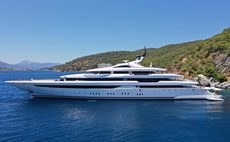
- See All Reviews
Featured Luxury Yachts for Charter
This is a small selection of the global luxury yacht charter fleet, with 3704 motor yachts, sail yachts, explorer yachts and catamarans to choose from including superyachts and megayachts, the world is your oyster. Why search for your ideal yacht charter vacation anywhere else?

136m | Lurssen
from $3,328,000 p/week ♦︎

115m | Lurssen
from $2,874,000 p/week ♦︎
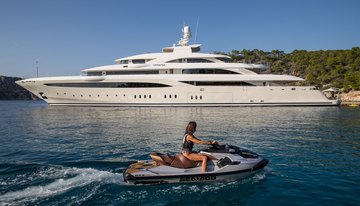
85m | Golden Yachts
from $1,001,000 p/week ♦︎

88m | Golden Yachts
from $1,222,000 p/week ♦︎

84m | Feadship
from $1,111,000 p/week ♦︎

93m | Feadship
from $1,556,000 p/week ♦︎

Maltese Falcon
88m | Perini Navi
from $490,000 p/week

122m | Lurssen
from $3,000,000 p/week
As Featured In
The YachtCharterFleet Difference
YachtCharterFleet makes it easy to find the yacht charter vacation that is right for you. We combine thousands of yacht listings with local destination information, sample itineraries and experiences to deliver the world's most comprehensive yacht charter website.
San Francisco
- Like us on Facebook
- Follow us on X
- Follow us on Instagram
- Find us on LinkedIn
- Add My Yacht
- Affiliates & Partners
Popular Destinations & Events
- St Tropez Yacht Charter
- Monaco Yacht Charter
- St Barts Yacht Charter
- Greece Yacht Charter
- Mykonos Yacht Charter
- Caribbean Yacht Charter
Featured Charter Yachts
- Maltese Falcon Yacht Charter
- Wheels Yacht Charter
- Victorious Yacht Charter
- Andrea Yacht Charter
- Titania Yacht Charter
- Ahpo Yacht Charter
Receive our latest offers, trends and stories direct to your inbox.
Please enter a valid e-mail.
Thanks for subscribing.
Search for Yachts, Destinations, Events, News... everything related to Luxury Yachts for Charter.
Yachts in your shortlist

The global authority in superyachting
- NEWSLETTERS
- Yachts Home
- The Superyacht Directory
- Yacht Reports
- Brokerage News
- The largest yachts in the world
- The Register
- Yacht Advice
- Yacht Design
- 12m to 24m yachts
- Monaco Yacht Show
- Builder Directory
- Designer Directory
- Interior Design Directory
- Naval Architect Directory
- Yachts for sale home
- Motor yachts
- Sailing yachts
- Explorer yachts
- Classic yachts
- Sale Broker Directory
- Charter Home
- Yachts for Charter
- Charter Destinations
- Charter Broker Directory
- Destinations Home
- Mediterranean
- South Pacific
- Rest of the World
- Boat Life Home
- Owners' Experiences
- Conservation and Philanthropy
- Interiors Suppliers
- Owners' Club
- Captains' Club
- BOAT Showcase
- Boat Presents
- Events Home
- World Superyacht Awards
- Superyacht Design Festival
- Design and Innovation Awards
- Young Designer of the Year Award
- Artistry and Craft Awards
- Explorer Yachts Summit
- Ocean Talks
- The Ocean Awards
- BOAT Connect
- Between the bays
- Golf Invitational
- BOATPro Home
- Superyacht Insight
- Global Order Book
- Premium Content
- Product Features
- Testimonials
- Pricing Plan
- Tenders & Equipment

Brokerage boat of the month: Aalto, the high-volume yacht with an interior by iconic Parisian designers
Every month we place a spotlight on one of the best-designed brokerage boats that have joined the market, changed agents or have had a significant price drop. For August, the 80-metre yacht Aalto is our Brokerage Boat of the Month.
Nuvolari Lenard was responsible for her exterior design, while iconic Parisian designers Agence Pinto worked up her interior. Aalto is listed for sale with multiple brokers for the Monaco Yacht Show , comprising Matt Pinckney at Burgess , Charles Carveles at Edmiston and James Pool at Y.CO. Her asking price is €79,750,000.
BOAT's brokerage editor says:
Aalto sports a powerful exterior by Nuvolari Lenard that contains a high-volume 2,310GT interior, exquisitely finished and detailed by Paris-based Agence Pinto. Constructed in the Netherlands by Oceanco , she is packed with design features – including a stabilised pool table, heated pool, owner's suite with two Jacuzzis, circular skylights, circular indoor-outdoor dining room – while remaining gimmick-free and purposeful, with life rafts positioned outboard for safe automatic deployment.
The brokers say:
Burgess' Matt Pinckney said: "This Dutch-built yacht offers a unique chance to own a pedigree yacht at a fraction of current build costs." Y.CO's James Pool agreed, adding: " Aalto offers a great opportunity in today’s market to purchase a reputable Oceanco Y700 platform, commercially compliant and ready to go." The third joint central agent, Edmiston's Charles Carveles concluded: "As part of the Oceanco Y700 series, Aalto is a proven platform for both owner's use and charters worldwide – with one owner from new and benefiting from constant maintenance."
Key features:
- Northern European pedigree
- Owner's deck and further eight guest cabins for total party of 18, including four VIP cabins
- Large sundeck with pool and swimming jets
- 20-knot top speed
- Considerable 2,310GT internal volume
- Substantial guest elevator
What makes her special?
Nuvolari Lenard's Dan Lenard exclusively told BOAT International that Aalto was the first of a range to use the Oceanco standard platform, named Y700. "This concept was new in the 80-metre-plus sector," he recalled, noting this was the first time that Aalto was based on a "3D superstructure' design". "Before, Aalto designs were flat." The superstructure also had "portions of the side decks being wider than the hull’s maximum beam", which is now quite commonplace in the industry.
"Her top deck pool was a daring step ahead on the outside deck design," he continued. "She marked Oceanco as an innovative and open-minded shipyard with a vision of pushing the bar, with every boat coming out of their sheds in the years to come." Her design followed the 81.3-metre Alfa Nero , which "introduced the stern pool", and the 85.5-metre Vibrant Curiosity , with a pool on the upper deck.
No expense was spared when it came to design details either, with Aalto originally decorated in 2007 by Agence Pinto under the artistic direction of the renowned designer Pietro Scaglione, who is famed for his maximalist extravagant interiors.
Thierry Seigle of Agence Pinto said: " Aalto is a floating masterpiece that embodies elegance and luxury in every detail of its design". He added that Pinto "infused this vessel with a unique Art Deco ambience. Every space on board reflects the opulence and glamour of the 1920s, with noble materials, geometric patterns and rich colours creating a sophisticated yet warm atmosphere". Carefully selected works of art are found throughout, with splendid lounges, cabins and relaxation areas, including a billiard room, "which have been designed to offer guests absolute comfort". Summing up: "We can see that she has stood the test of time over the past 20 years."
Price comparison:
BOATPro data shows comparable yachts for sale to the 80-metre Aalto for sale, asking €79,750,000 with Burgess, Edmiston and Y.CO: 74-metre Global , asking €79,000,000 with IYC ; 77-metre Yersin , asking €59,000,000 with Edmiston ; 78-metre Amaryllis , asking €89,000,000 with Moravia Yachting ; 78-metre Energy , POA with Burgess ; 80-metre Silver Edge , asking $75,000,000 with Fraser ; 80-metre Elements , asking €112,000,000 with Camper & Nicholsons ; 90-metre Dar , asking €208,000,000 with Large Yacht Corp. ; 91-metre Lady Lara , asking €230,000,000 with Y.CO .
Sign up to BOAT Briefing email
Latest news, brokerage headlines and yacht exclusives, every weekday
By signing up for BOAT newsletters, you agree to our Terms of Use and our Privacy Policy .
More about this yacht
Yachts for sale, similar yachts for sale, yachts for charter, more stories, most popular, from our partners, sponsored listings.

COMMENTS
Yacht Broker Fees & Commission: What Is the Boat Broker Commission for Selling a Boat? "For their dedication, yacht brokers receive a yacht broker agent fee or commission after the yacht sale is completed, which is typically 10%. The distribution of commission between the yacht buyer representative and yacht owner representative is usually 60/40.
Yacht brokers take a percentage of the sale. Across the U.S. and much of the world, 10% is common brokerage fee for most transactions. But that is not a hard and fast number and it can vary with the size of your deal and the location of your boat. You pay the percentage on the final selling price, not the listing price, and price adjustments ...
Yacht brokers charge a commission when the vessel is sold, and the commission amount will be set in writing when the seller signs a listing agreement with the broker. If another broker brings a buyer to the table through a co-brokerage arrangement, the total commission will normally be shared between the brokers; it should not raise the commission.
When buying a boat, don't wander into shark-infested waters without a buyer's broker. The process begins when the boat seller lists the yacht with a broker. Generally, the seller agrees to pay a commission (usually 10 percent of the purchase price) to the selling broker at the closing. So even at this early stage the seller has professional ...
The base salary for a yacht broker is typically between $15,000-$30,000. On top of that, a yacht broker typically earns around 10% commission on the sale value depending on the size of the vessel. Here are the salary and commissions yacht brokers typically make from a sale. Table of Contents.
This commission is a percentage of the boat's selling price. On average, a broker's commission ranges from 2.5% to 10%. A detailed examination at Boating Buddy reveals that for a $100,000 boat, a broker could charge between $2,500 to $10,000 depending on several factors including service level and negotiation.
Brokerage Fees. The commission paid to a yacht broker is typically around 10% of the transaction value. However, for yachts costing more than $10 million, the commission is not more than 10%. The commission is usually shared between the buyer's representative and the seller's representative on a 60/40 or 50/50 basis.
Yacht broker's fees are usually based on commission (typically around 10%) or at a fixed price. Once you have agreed on a rate, you will be provided with a standard written agreement to sign, which may be likely to include clauses concerning insurance and the broker's exclusive rights to sell your boat during the agreement term.
The most common method for calculating superyacht brokerage fees is a commission based on the yacht's sale price. This percentage usually ranges from 5% to 10%. For example, if a superyacht sells for $10 million, the broker's fee could be between $500,000 and $1 million. The exact percentage is often negotiable and can be influenced by the ...
High-performing brokers have the potential to exceed $100,000 per year. Typical Commission Range: 2.5% - 3% for standard boats. Up to 10% for luxury yachts. Earnings are also tied to geographic location, market trends, expertise, and the broker's ability to network and close sales effectively.
Commissions are usually 10 percent, though that may vary depending on your boat and your location. Small boats are rarely sold by brokers, since they produce too little income for the amount of time required to make the sale. Large boats often involve complex negotiations (documentation, etc.) that are simplified by yacht brokers.
However market studies have found that most yacht brokers will make up to $120,000 a year, especially if they work with high end clients that deal with expensive yacht models. But although it is possible to make over a hundred grand in a year, it's not too common. The average salary for a yacht broker actually rests at just under $70,000 a ...
Boat brokers are similar to real-estate agents, but with important differences: They're far less regulated, and their commission is 10 percent rather than six percent. ... suggest likely boats for you to view, assist in negotiating a price, and help with the paperwork. Typically, a buyer's broker gets a commission split from the seller's broker ...
The yacht broker will also want to talk to his industry contacts to get an idea for how much the yacht is sold for. The yacht broker has the important job of saving the seller or buyer time and pain when it comes to selling a boat. ... Some yacht brokers take a 10% commission on the sale of the boat and might bring it down in order to secure a ...
The standard commission rates are MYBA's 'sliding scale' - 10 per cent on the first $10 million of value, 5 per cent on the second $10 million, and 2.5 per cent on anything above - and the US structure, which is 10 per cent of the gross sales price. "It causes problems because a broker may show his client a boat, and the client ...
This commission will be paid to the selling broker at the closing. So even at this early stage the seller has professional representation in the transaction. Salaries for a yacht broker can range in the U.S. from 80,000 to over a million dollars annually, with an estimated average of $105,000 per year. Yacht Broker Contact Lists. To be a ...
What does a yacht broker do? Most yacht brokers work in a similar way to estate agents. They are representatives consulted to find and purchase yachts, as well as appointed to list, represent, and sell yachts. Traditionally, the seller pays the commissions that a yacht broker earns, yet brokers have a duty to both buyer and seller in every ...
How Much Does A Yacht Broker Make? Researching the compensation for a particular industry or position is important before making a career move. In most cases, a yacht broker is not paid a salary, rather paid solely on commission. The standard industry commission is 10% based on the selling price of the vessel. This means compensation can range ...
The commission rate is fairly standard throughout the industry. The yacht pays 15% to the broker on average, sometimes a bit more or less, depending on the week. It could be a bit more if you have a Travel Agent you work with as well as the Yacht Charter Broker. Read more here.
2. What determines a yacht broker's commission? The primary factor that determines a yacht broker's commission is the final selling price of the yacht. Typically, the commission is a percentage of the final sale price, and this rate can vary. 3. How much is the typical commission rate? While the commission rate can differ, it is customary ...
How much will a yacht broker cost? Absolutely nothing. All of these services are at no extra cost to you, as all commissions paid to brokers are included in the package — in other words, whether you decide to make use of our partners' service , contact a broker or prepare your charter yourself makes no difference to the price tag attached ...
How much will you pay a broker for his services? For the most part, brokers typically take a commission off the top once the vessel has been sold. The industry standard is 10 percent, although for large yachts, the fee may be negotiable. When the same broker lists the boat and finds a buyer for it, that broker gets the whole commission.
One of the major hidden costs of buying and selling property in Germany is the estate agent's commission, or broker's fee. We look at some of the unusual rules around it - and how much you can ...
The brokers say: Burgess' Matt Pinckney said: "This Dutch-built yacht offers a unique chance to own a pedigree yacht at a fraction of current build costs." Y.CO's James Pool agreed, adding: "Aalto offers a great opportunity in today's market to purchase a reputable Oceanco Y700 platform, commercially compliant and ready to go."
When the same broker lists the boat and finds a buyer for it, that broker gets the whole commission. But most boats are placed in a multiple listing service, the same as real estate. If another broker finds a buyer, the commission is split — often 50-50, but sometimes the selling broker gets 60 percent and the listing broker 40 percent ...